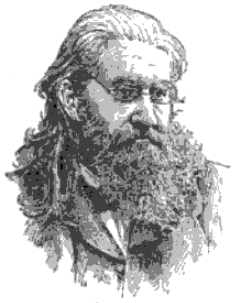Constantine Hering
Constantine Hering (1800–1880) was a German-born physician who is often considered the father of Homeopathy in the United States. He is known for his development of the Law of Cure, which suggests that healing progresses from the deepest parts of the body to the extremities, from the emotional and mental aspects to the physical, and in reverse order of the symptoms' appearance.
Early Life and Education[edit | edit source]
Born on January 1, 1800, in Oschatz, Saxony, Germany, Hering initially intended to pursue a career in surgery. His interest in homeopathy began somewhat inadvertently when he was tasked with disproving the theories of Samuel Hahnemann, the founder of homeopathy. Through his research, Hering became convinced of the validity of homeopathic principles and switched his focus from conventional medicine to homeopathy.
Career[edit | edit source]
Hering graduated from the University of Leipzig in 1826, where he had begun his medical studies. After his conversion to homeopathy, he faced significant opposition from the medical community in Germany. This led him to emigrate to Suriname, where he conducted some of his early experiments with snake venom, leading to the development of the homeopathic remedy Lachesis, derived from the venom of the bushmaster snake.
In 1833, Hering moved to the United States, settling in Philadelphia, Pennsylvania, where he played a pivotal role in the establishment and spread of homeopathy. He founded the North American Academy of the Homeopathic Healing Art (also known as the Allentown Academy) in 1835, the first homeopathic medical college in the world. Hering also helped to establish the Hahnemann Medical College in Philadelphia and was instrumental in founding the American Institute of Homeopathy, the first national medical association in the United States.
Contributions to Homeopathy[edit | edit source]
Hering is best known for his contributions to homeopathic philosophy and practice. His Law of Cure, also known as "Hering's Law of Direction of Cure," outlines the direction that symptoms are supposed to disappear under homeopathic treatment. He also contributed significantly to the homeopathic materia medica, documenting the symptoms and effects of numerous remedies. Hering's Guiding Symptoms of Our Materia Medica is a monumental work that remains a fundamental reference for homeopaths.
Legacy[edit | edit source]
Constantine Hering's legacy in the field of homeopathy is profound. His work and teachings laid the foundation for homeopathic education and practice in the United States. He is remembered not only for his contributions to the materia medica and homeopathic philosophy but also for his role in establishing homeopathy as a respected system of medicine in the 19th century.
Hering died on July 23, 1880, in Philadelphia, but his influence on homeopathy continues to be felt. He is often referred to as the "Father of American Homeopathy," a testament to his significant impact on the field.
Search WikiMD
Ad.Tired of being Overweight? Try W8MD's NYC physician weight loss.
Semaglutide (Ozempic / Wegovy and Tirzepatide (Mounjaro / Zepbound) available. Call 718 946 5500.
Advertise on WikiMD
|
WikiMD's Wellness Encyclopedia |
| Let Food Be Thy Medicine Medicine Thy Food - Hippocrates |
Translate this page: - East Asian
中文,
日本,
한국어,
South Asian
हिन्दी,
தமிழ்,
తెలుగు,
Urdu,
ಕನ್ನಡ,
Southeast Asian
Indonesian,
Vietnamese,
Thai,
မြန်မာဘာသာ,
বাংলা
European
español,
Deutsch,
français,
Greek,
português do Brasil,
polski,
română,
русский,
Nederlands,
norsk,
svenska,
suomi,
Italian
Middle Eastern & African
عربى,
Turkish,
Persian,
Hebrew,
Afrikaans,
isiZulu,
Kiswahili,
Other
Bulgarian,
Hungarian,
Czech,
Swedish,
മലയാളം,
मराठी,
ਪੰਜਾਬੀ,
ગુજરાતી,
Portuguese,
Ukrainian
Medical Disclaimer: WikiMD is not a substitute for professional medical advice. The information on WikiMD is provided as an information resource only, may be incorrect, outdated or misleading, and is not to be used or relied on for any diagnostic or treatment purposes. Please consult your health care provider before making any healthcare decisions or for guidance about a specific medical condition. WikiMD expressly disclaims responsibility, and shall have no liability, for any damages, loss, injury, or liability whatsoever suffered as a result of your reliance on the information contained in this site. By visiting this site you agree to the foregoing terms and conditions, which may from time to time be changed or supplemented by WikiMD. If you do not agree to the foregoing terms and conditions, you should not enter or use this site. See full disclaimer.
Credits:Most images are courtesy of Wikimedia commons, and templates, categories Wikipedia, licensed under CC BY SA or similar.
Contributors: Prab R. Tumpati, MD

